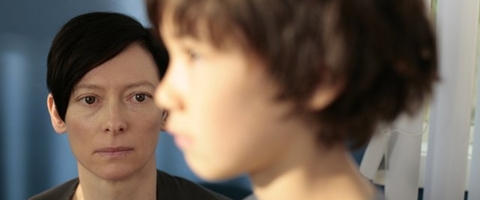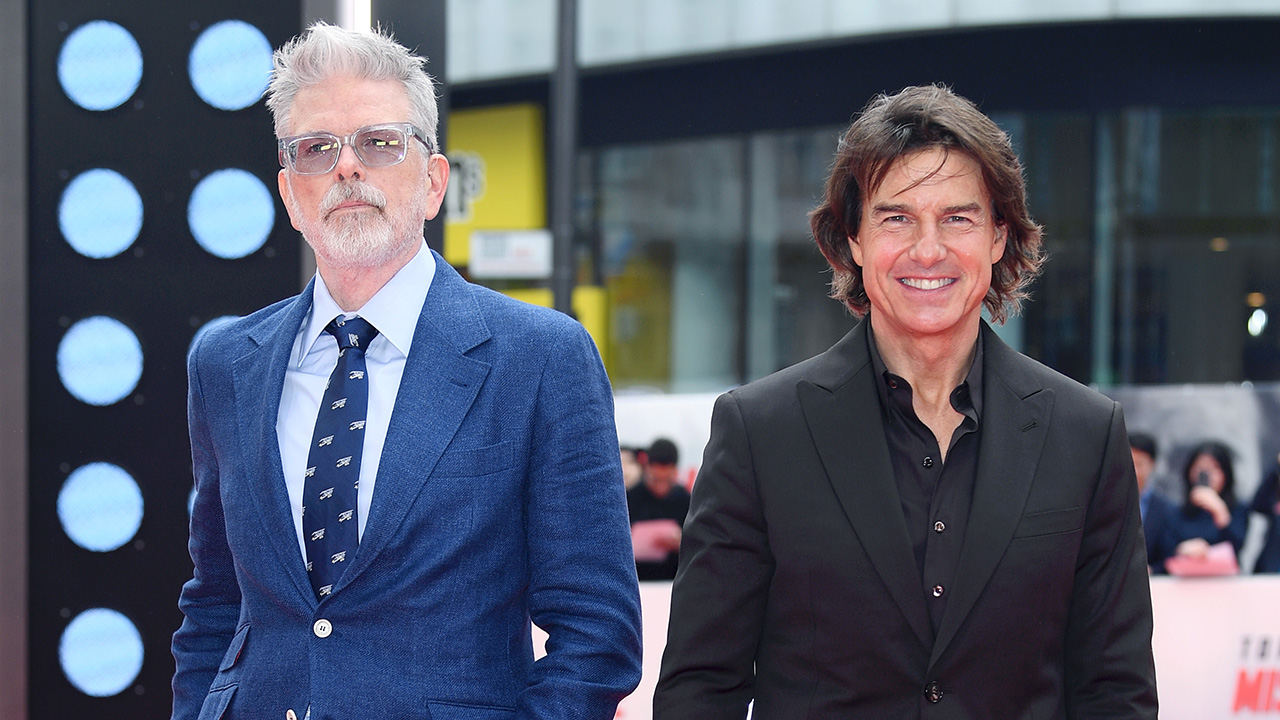In as much as Requiem for a Dream can work as a theatrical D.A.R.E. program, We Need to Talk About Kevin is a suitable proponent of birth control. Before I became a father, one of my naiveté's bigger worries was having one of those children that acts completely inconsolable in a restaurant or a theater. We will always have the ever-present threat of violence to contend with, but it’s customarily viewed through the fear of victimization; no one should ever have to worry about their child becoming the monster. But I guess it’s our Second Amendment right to have that fear. Go America! (Guns and bows aren’t the same. I realize this.) The importance of any event in our lives can usually be gauged by the length of its aftermath. The things we do tend to be less important than the people we do them with. Past memories, however stylized, are sometimes the only things that make the present tolerable. Kids can be really fucking mental.
Ironically, the moments in the grief-filled We Need to Talk About Kevin that are most depressing are when characters are smiling and having a good time. Because we’re all too aware those times are long gone. In her disturbingly authentic portrayal of Eva Khatchadourian, Tilda Swinton is a virtuoso of melancholic chagrin. A former travel writer, her current life is plagued by scrutinized mockery on the lighter side, and by vocal hatred and vandalism on the darker side. When not working her entry-level secretarial position, she retreats to bottles of pills and alcohol for therapy. The scourge of her woes is her intentionally horrific son, Kevin, who would have been the inspiration for The Omen’s Damien, the Rosemary’s Baby baby, or even Satan himself had it been a true story told near the beginning of time. One early scene depicts Eva coping with the never-ending screams of infant Kevin by standing amongst a group of men jackhammering the pavement; her momentary relief drowning herself in this noise is both amusingly understandable and heartbreaking all at once.
We watch Kevin age from toddler to teenager, played by actors Rock Duer, Jasper Newell, and Ezra Miller. Though the emotional nonchalance shown to his blindly optimistic father, Franklin (John C. Reilly), isn’t always quite loving, the sheer disdain he spews at Eva is downright menacing. I expect to never fully enjoy any future roles taken by Newell and Miller based on my genuine hatred for Kevin as a character, which is a backwards compliment that speaks worlds of the writing and performance.
The line in the sand is drawn between Kevin’s pre-existing lack of empathy, and its continual growth as Eva’s matronly role, is strained to multiple breaking points. Is he naturally a lifelong evil asshole, or is this behavior furthered by outside influences? The film’s timeline slips back and forth between different stages of Eva’s past, all from her possibly skewed perspective. So while Kevin is obviously an insanely shitty son, we’re never under the impression that Eva herself in an angel. She is a human being, repeatedly thwarted by Kevin’s insistence on ratcheting up her frustration in any given situation, from purposefully prolonging his potty training to wrapping his younger sister, Celia, up in garland during a game of Christmas Kidnapping. Eva’s range of reactions isn’t entirely ethical, but they’re emotionally sound. Having watched the film twice now, I absolutely wish Eva was vehemently pro-choice early in life so that this “nature vs. nurture” question wasn’t applicable. But then what would I be doing right now?
Adapted from the “unfilmable” novel by Lionel Shriver, the acclaimed director/co-screenwriter Lynne Ramsay does a remarkable job of showcasing every uncomfortable detail in a movie filled with them, using colors and sounds as much as the dialogue to tell the story. The entire cast is impeccable, down to extras whose screen time consists of glaring in the distance. Despite the free-flowing plot progression, one is never lost, always the voyeur in Eva’s life of agony and shame. By the time we get to the crux of the film, Kevin’s mostly off-screen school massacre, we feel less sorry for these young victims than we do for those Kevin has been affecting his entire life. And the sound of lawn sprinklers may never sound inconsequential again. Even the cardboard packaging for this film is effective, from Eva and Kevin’s split headshots as you open it, to Kevin’s colorful and cold childhood drawings on the inside. There’s an intriguing essay by psychoanalyst Mark Stafford, “The Heart of Evil,” included as well, which focuses more on Kevin’s motivations and the film’s minimal take on violence. Though the DVD itself looks great, the crispness of the Blu-ray is enough to make you feel like you’re watching this family’s degradation from the next room of their house. All things told, I had problems with the pop music soundtrack from decades past, as the songs seemed disjointed to me.
“Behind the Scenes of Kevin” is exactly what it implies: a half-hour of the cast, director, and producers dissecting the characters and plot over production stills and incidental filming. Everyone’s input is extremely insightful, particularly when discussing how the family’s relationship is depicted from both the acting and production aspects. While watching people talk isn’t always exciting, it adds another layer of understanding one may not have had before.
Hilton Als gives a 17-minute interview for a "Tribute to Tilda Swinton" at the 2011 Telluride Film Festival. It’s a treat to watch this talented actress speak about her career from different angles, though Kevin is not the focus here. On the flip side, the three-minute interview with novel author Lionel Shriver is entirely kept to the book-to-movie translation and her pleasure in the minimal input she gave filmmakers on how the story should be told. Lastly, there are four minutes of silent extra footage from the “La Tomatina” Tomato festival depicted in the movie as Eva’s freedom-filled youth before Kevin came along. I am inclined to go there now, even though I dislike tomatoes.
Your Daily Blend of Entertainment News
Easily one of the more psychologically wrought releases of the past year, We Need to Talk About Kevin deserves to be seen and discussed. Not everyone will share my takeaway from the story, but I consider that part of the film’s storytelling power.

Nick is a Cajun Country native and an Assistant Managing Editor with a focus on TV and features. His humble origin story with CinemaBlend began all the way back in the pre-streaming era, circa 2009, as a freelancing DVD reviewer and TV recapper. Nick leapfrogged over to the small screen to cover more and more television news and interviews, eventually taking over the section for the current era and covering topics like Yellowstone, The Walking Dead and horror. Born in Louisiana and currently living in Texas — Who Dat Nation over America’s Team all day, all night — Nick spent several years in the hospitality industry, and also worked as a 911 operator. If you ever happened to hear his music or read his comics/short stories, you have his sympathy.

